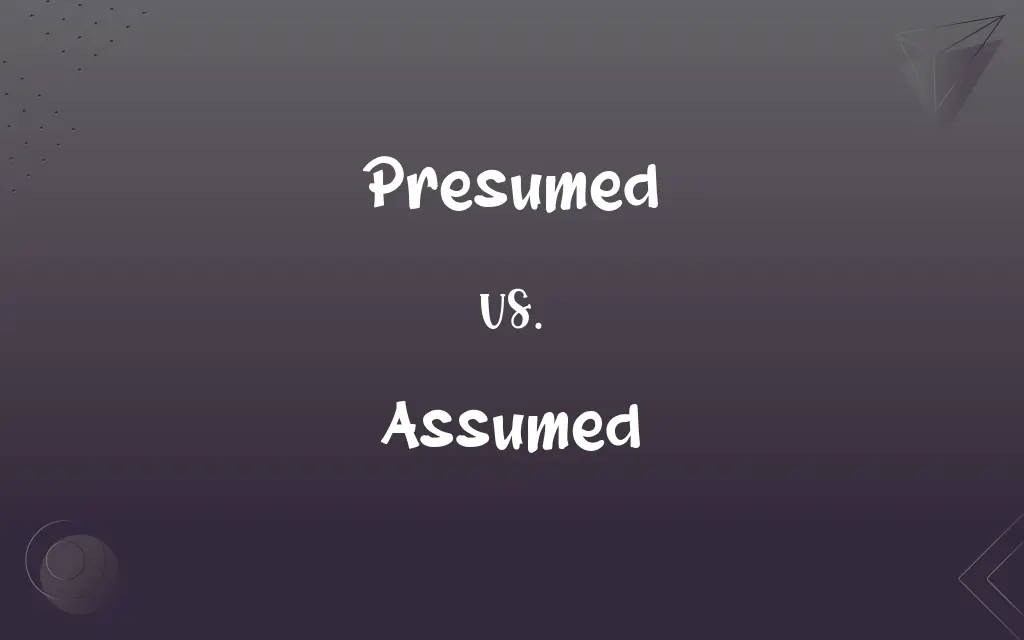Presumed vs. Assumed: What's the Difference?
Edited by Aimie Carlson || By Janet White || Updated on October 12, 2023
"Presumed" implies a belief based on probability or reasonable grounds, while "Assumed" suggests accepting something as true without direct evidence.

Key Differences
"Presumed" is a term that often infers a belief based on certain indicative factors or logical inference. For instance, if someone is seen frequently with a particular group of friends, it might be "presumed" they are close. On the other hand, "Assumed" denotes taking something for granted without concrete proof. Someone might "assume" a quiet person is shy, without actually knowing the reason for their quietness.
"Presumed" often has legal implications, such as in "presumed innocent until proven guilty." It operates on the notion of a starting point of belief, typically based on legal or social standards. Conversely, "Assumed" doesn't necessarily have a legal connotation and is used more broadly to describe situations where conclusions are drawn without direct evidence. An individual might "assume" it will rain because of dark clouds, even if there's no forecast.
Another distinction is the foundation for the belief. Something "presumed" generally has a more substantial basis or reason for the belief. For instance, one might "presume" someone attended a party if they received an invitation and expressed excitement about it. Whereas, something "assumed" might be based more on personal bias or preconceptions without actual evidence, such as assuming someone doesn't like spicy food without ever seeing their food preferences.
Lastly, both terms denote an element of uncertainty, but the degree varies. "Presumed" suggests a higher degree of confidence in the belief, based on circumstantial evidence or logic. "Assumed" is more about taking a leap without solid footing, leaning more on intuition or generalizations.
Comparison Chart
Basis
Probability or reasonable grounds
Lack of direct evidence
ADVERTISEMENT
Legal Connotations
Often used (e.g., presumed innocent)
Rarely has direct legal implications
Degree of Certainty
Higher confidence based on some evidence or logic
More intuitive or general
Context of Usage
More formal contexts
Broadly used in various contexts
Implication of Bias/Prejudice
Less likely to imply bias
Can often imply personal bias or preconception
Presumed and Assumed Definitions
Presumed
Used to convey a supposition or uncertainty.
The presumed reason for his absence was his illness.
ADVERTISEMENT
Assumed
Adopted in order to deceive or pretend.
He assumed a different name to remain anonymous.
Presumed
Operating on an assumption or possibility.
The presumed benefits of the medication were discussed in the meeting.
Assumed
Characterized by pretense or presumption.
His calm was merely an assumed facade.
Presumed
Based on likelihood or good reason.
The presumed heir to the throne was the king's eldest son.
Assumed
Taken as true without evidence.
Her joy was an assumed sign of the good news.
Presumed
Taken for granted without direct evidence.
She presumed she'd be invited to the wedding, given their close friendship.
Assumed
Presumed to be true without validation.
The assumed facts in the case turned out to be incorrect.
Presumed
Believed to be true on the basis of probability.
He was presumed dead after going missing for several years.
Assumed
Taken up or used so as to deceive; pretended
An assumed name.
Presumed
To take for granted as being true in the absence of proof to the contrary
"I presume you're tired after the long ride" (Edith Wharton).
Assumed
Taken for granted; supposed
An assumed increase in population.
Presumed
To constitute reasonable evidence for assuming; appear to prove
A signed hotel bill presumes occupancy of a room.
Assumed
Simple past tense and past participle of assume
Presumed
To venture without authority or permission; dare
He presumed to invite himself to dinner.
Assumed
Used in a manner intended to deceive; pretended; simulated.
Presumed
To take for granted that something is true or factual; make a supposition.
Assumed
Supposed or presumed.
Presumed
To act presumptuously or take unwarranted advantage of something
Don't presume on their hospitality.
Assumed
Supposed.
Presumed
Simple past tense and past participle of presume
Assumed
Pretended; hypocritical; make-believe; as, an assumed character.
Presumed
Appearing to be the most probable, often with some preparations starting to be made for it.
Assumed
Accepted as real or true without proof;
An assumed increase in population
The assumed reason for his absence
Assumptive beliefs
His loyalty was taken for granted
Presumed
Presumed to be true in the absence of proof to the contrary;
The presumed reason for his anger
Assumed
Taken as your right without justification;
Was hearing evidence in an assumed capacity
Congress's arrogated powers over domains hitherto belonging to the states
Assumed
Adopted in order to deceive;
An assumed name
An assumed cheerfulness
A fictitious address
Fictive sympathy
A pretended interest
A put-on childish voice
Sham modesty
Assumed
Undertaken or accepted as a responsibility or duty.
The leader assumed the responsibilities of the previous manager.
FAQs
Can I say "I assumed you knew"?
Yes, it means you took for granted that someone had certain knowledge without concrete proof.
Are "Presumed" and "Assumed" synonyms?
While similar, they differ in their basis and certainty. "Presumed" leans on probability, while "Assumed" lacks direct evidence.
Does "Presumed" always relate to legal contexts?
No, but it often has legal connotations like "presumed innocent."
Can names or identities be "assumed"?
Yes, one can "assume" a different name or identity, often to deceive or remain anonymous.
Can both words imply lack of certainty?
Yes, both involve degrees of uncertainty, but "Presumed" usually has more substantial grounding.
Can both words be used interchangeably?
In some contexts, yes, but they have nuanced differences.
Does "Presumed" imply a stronger belief than "Assumed"?
Typically, "Presumed" suggests a higher degree of confidence based on some evidence or logic.
Does "Presumed" always need evidence?
Not always, but it often implies a belief based on some logical or probable basis.
Is "Assumed" more about intuition?
It can be, as it often leans on personal beliefs or generalizations without direct evidence.
Is "Assumed" always negative?
No, it's neutral but can be negative if it implies unfounded bias or prejudice.
Can you "presume" someone's feelings?
Yes, you can believe someone feels a certain way based on their actions or circumstances.
Can something be "assumed" in scientific experiments?
Yes, researchers often work with assumed variables or conditions in experiments.
Can I say "It's assumed common knowledge"?
Yes, suggesting that most people are expected to know it, even if it hasn't been explicitly stated.
Can an "assumed" fact be validated later?
Yes, just because something is assumed doesn't mean it can't be proven true later.
Can "Assumed" mean pretending?
Yes, as in "assuming a role" or "assuming indifference," it can imply pretense.
Which is more formal, "Presumed" or "Assumed"?
"Presumed" tends to be more formal, especially in legal contexts.
Is a "presumed" outcome guaranteed?
No, while it's based on some logic or evidence, it still contains an element of uncertainty.
Can you "presume" a result based on previous patterns?
Yes, patterns can provide a reasonable ground for presumption.
Is "presumption" always a safe approach?
Not always. Presuming without sufficient reason can lead to errors in judgment.
Does "presumed" imply more responsibility in decision-making?
It can, as decisions based on presumption usually rely on some logical basis or prior evidence.
About Author
Written by
Janet WhiteJanet White has been an esteemed writer and blogger for Difference Wiki. Holding a Master's degree in Science and Medical Journalism from the prestigious Boston University, she has consistently demonstrated her expertise and passion for her field. When she's not immersed in her work, Janet relishes her time exercising, delving into a good book, and cherishing moments with friends and family.
Edited by
Aimie CarlsonAimie Carlson, holding a master's degree in English literature, is a fervent English language enthusiast. She lends her writing talents to Difference Wiki, a prominent website that specializes in comparisons, offering readers insightful analyses that both captivate and inform.































































